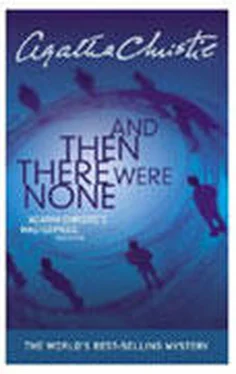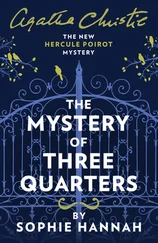Agatha Christie - And Then There Were None
Здесь есть возможность читать онлайн «Agatha Christie - And Then There Were None» весь текст электронной книги совершенно бесплатно (целиком полную версию без сокращений). В некоторых случаях можно слушать аудио, скачать через торрент в формате fb2 и присутствует краткое содержание. Жанр: Классический детектив, на английском языке. Описание произведения, (предисловие) а так же отзывы посетителей доступны на портале библиотеки ЛибКат.
- Название:And Then There Were None
- Автор:
- Жанр:
- Год:неизвестен
- ISBN:нет данных
- Рейтинг книги:4.5 / 5. Голосов: 2
-
Избранное:Добавить в избранное
- Отзывы:
-
Ваша оценка:
- 100
- 1
- 2
- 3
- 4
- 5
And Then There Were None: краткое содержание, описание и аннотация
Предлагаем к чтению аннотацию, описание, краткое содержание или предисловие (зависит от того, что написал сам автор книги «And Then There Were None»). Если вы не нашли необходимую информацию о книге — напишите в комментариях, мы постараемся отыскать её.
And Then There Were None — читать онлайн бесплатно полную книгу (весь текст) целиком
Ниже представлен текст книги, разбитый по страницам. Система сохранения места последней прочитанной страницы, позволяет с удобством читать онлайн бесплатно книгу «And Then There Were None», без необходимости каждый раз заново искать на чём Вы остановились. Поставьте закладку, и сможете в любой момент перейти на страницу, на которой закончили чтение.
Интервал:
Закладка:
"Then there's Miss Emily Brent. Girl, Beatrice Taylor, was in service with her. Got pregnant, was turned out by her mistress and went and drowned herself. Not a nice business - but again not criminal."
"That," said the A.C., "seems to be the point. U.N. Owen dealt with cases that the law couldn't touch."
Maine went stolidly on with his list.
"Young Marston was a fairly reckless car driver - had his license endorsed twice and he ought to have been prohibited from driving, in my opinion. That's all there is to him. The two names John and Lucy Combes were those of two kids he knocked down and killed near Cambridge. Some friends of his gave evidence for him and he was let off with a fine.
"Can't find anything definite about General Macarthur. Fine record - war service - all the rest of it. Arthur Richmond was serving under him in France and was killed in action. No friction of any kind between him and the General. They were close friends, as a matter of fact. There were some blunders made about that time - commanding officers sacrificed men unnecessarily - possibly this was a blunder of that kind."
"Possibly," said the A.C.
"Now, Philip Lombard. Lombard has been mixed up in some very curious shows abroad. He's sailed very near the law once or twice. Got a reputation for daring and for not being over-scrupulous. Sort of fellow who might do several murders in some quiet out-of-the-way spot.
"Then we come to Blore." Maine hesitated. "He of course was one of our lot."
The other man stirred.
"Blore," said the Assistant Commissioner forcibly, "was a bad hat!"
"You think so, sir?"
The A.C. said:
"I always thought so. But he was clever enough to get away with it. It's my opinion that he committed black perjury in the Landor case. I wasn't happy about it at the time. But I couldn't find anything. I put Hams onto it and he couldn't find anything but I'm still of the opinion that there was something to find if we'd known how to set about it. The man wasn't straight."
There was a pause, then Sir Thomas Legge said:
"And Isaac Morris is dead, you say? When did he die?"
"I thought you'd soon come to that, sir. Isaac Morris died on the night of August 8th. Took an overdose of sleeping stuff - one of the barbiturates, I understand. There wasn't anything to show whether it was accident or suicide."
Legge said slowly:
"Care to know what I think, Maine?"
"Perhaps I can guess, sir."
Legge said heavily:
"That death of Morris' is a damned sight too opportune!"
Inspector Maine nodded. He said:
"I thought you'd say that, sir."
The Assistant Commissioner brought down his fist with a bang on the table. He cried out:
"The whole thing's fantastic - impossible. Ten people killed on a bare rock of an island - and we don't know who did it, or why, or how."
Maine coughed. He said:
"Well, it's not quite like that, sir. We do know why, more or less. Some fanatic with a bee in his bonnet about justice. He was out to get people who were beyond the reach of the law. He picked ten people - whether they were really guilty or not doesn't matter -"
The Commissioner stirred. He said sharply:
"Doesn't it? It seems to me -"
He stopped. Inspector Maine waited respectfully. With a sigh Legge shook his head.
"Carry on," he said. "Just for a minute I felt I'd got somewhere. Got, as it were, the clue to the thing. It's gone now. Go ahead with what you were saying."
Maine went on:
"There were ten people to be - executed, let's say. They were executed. U.N. Owen accomplished his task. And somehow or other he spirited himself off that island into thin air."
The A.C. said:
"First-class vanishing trick. But you know, Maine, there must be an explanation."
Maine said:
"You're thinking, sir, that if the man wasn't on the island, he couldn'l have left the island, and according to the account of the interested parties he never was on the island. Well, then the only explanation possible is that he was actually one of the ten."
The A.C. nodded.
Maine said earnestly:
"We thought of that, sir. We went into it. Now, to begin with, we're not quite in the dark as to what happened on Indian Island. Vera Claythorne kept a diary, so did Emily Brent. Old Wargrave made some notes - dry legal cryptic stuff, but quite clear. And Blore made notes too. All those accounts tally. The deaths occurred in this order: Marston, Mrs. Rogers, Macarthur, Rogers, Miss Brent, Wargrave. After his death Vera Claythorne's diary states that Armstrong left the house in the night and that Blore and Lombard had gone after him. Blore has one more entry in his notebook. Just two words: 'Armstrong disappeared.'
"Now, sir, it seemed to me, taking everything into account, that we might find here a perfectly good solution. Armstrong was drowned, you remember. Granting that Armstrong was mad, what was to prevent him having killed off all the others and then committed suicide by throwing himself over the cliff, or perhaps while trying to swim to the mainland?
"That was a good solution - but it won't do. No, sir, it won't do. First of all there's the police surgeon's evidence. He got to the island early on the morning of August 13th. He couldn't say much to help us. All he could say was that all the people had been dead at least thirty-six hours and probably a good deal longer. But he was fairly definite about Armstrong. Said he must have been from eight to ten hours in the water before his body was washed up. That works out at this, that Armstrong must have gone into the sea sometime during the night of the 10th-11th - and I'll explain why. We found the point where the body was washed up - it had been wedged between two rocks and there were bits of cloth, hair, etc. on them. It must have been deposited there at high water on the 11th - that's to say round about 11 o'clock A.M. After that, the storm subsided, and succeeding high water marks are considerably lower.
"You might say, I suppose that Armstrong managed to polish off the other three before he went into the sea that night. But there's another point and one you can't get over. Armstrong's body had been dragged above high water mark. We found it well above the reach of any tide. And it was laid out straight on the ground - all neat and tidy.
"So that settles one point definitely. Some one was alive on the island after Armstrong was dead."
He paused and then went on.
"And that leaves - just what exactly? Here's the position early on the morning of the 11th. Armstrong has 'disappeared' (drowned). That leaves us three people. Lombard, Blore and Vera Claythorne. Lombard was shot. His body was down by the sea - near Armstrong's. Vera Claythorne was found hanged in her own bedroom. Blore's body was on the terrace. His head was crushed in by a heavy marble clock that it seems reasonable to suppose fell on him from the window above."
The A.C. said sharply:
"Whose window?"
"Vera Claythorne's. Now, sir, let's take each of these cases separately. First Philip Lombard. Let's say he pushed over that lump of marble onto Blore - then he doped Vera Claythorne and strung her up. Lastly, he went down to the seashore and shot himself.
"But if so, woo took away the revolver from him? For that revolver was found up in the house just inside the door at the top of the stairs - Wargrave's room."
The A.C. said:
"Any fingerprints on it?"
"Yes, sir, Vera Claythorne's."
"But, man alive, then -"
"I know what you're going to say, sir. That it was Vera Claythorne. That she shot Lombard, took the revolver back to the house, toppled the marble block onto Blore and then - hanged herself.
"And that's quite all right - up to a point. There's a chair in her bedroom and on the seat of it there are marks of seaweed same as on her shoes. Looks as though she stood on the chair, adjusted the rope round her neck and kicked away the chair.
Читать дальшеИнтервал:
Закладка:
Похожие книги на «And Then There Were None»
Представляем Вашему вниманию похожие книги на «And Then There Were None» списком для выбора. Мы отобрали схожую по названию и смыслу литературу в надежде предоставить читателям больше вариантов отыскать новые, интересные, ещё непрочитанные произведения.
Обсуждение, отзывы о книге «And Then There Were None» и просто собственные мнения читателей. Оставьте ваши комментарии, напишите, что Вы думаете о произведении, его смысле или главных героях. Укажите что конкретно понравилось, а что нет, и почему Вы так считаете.












